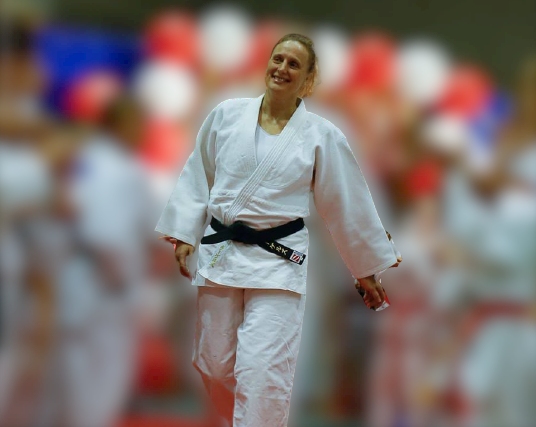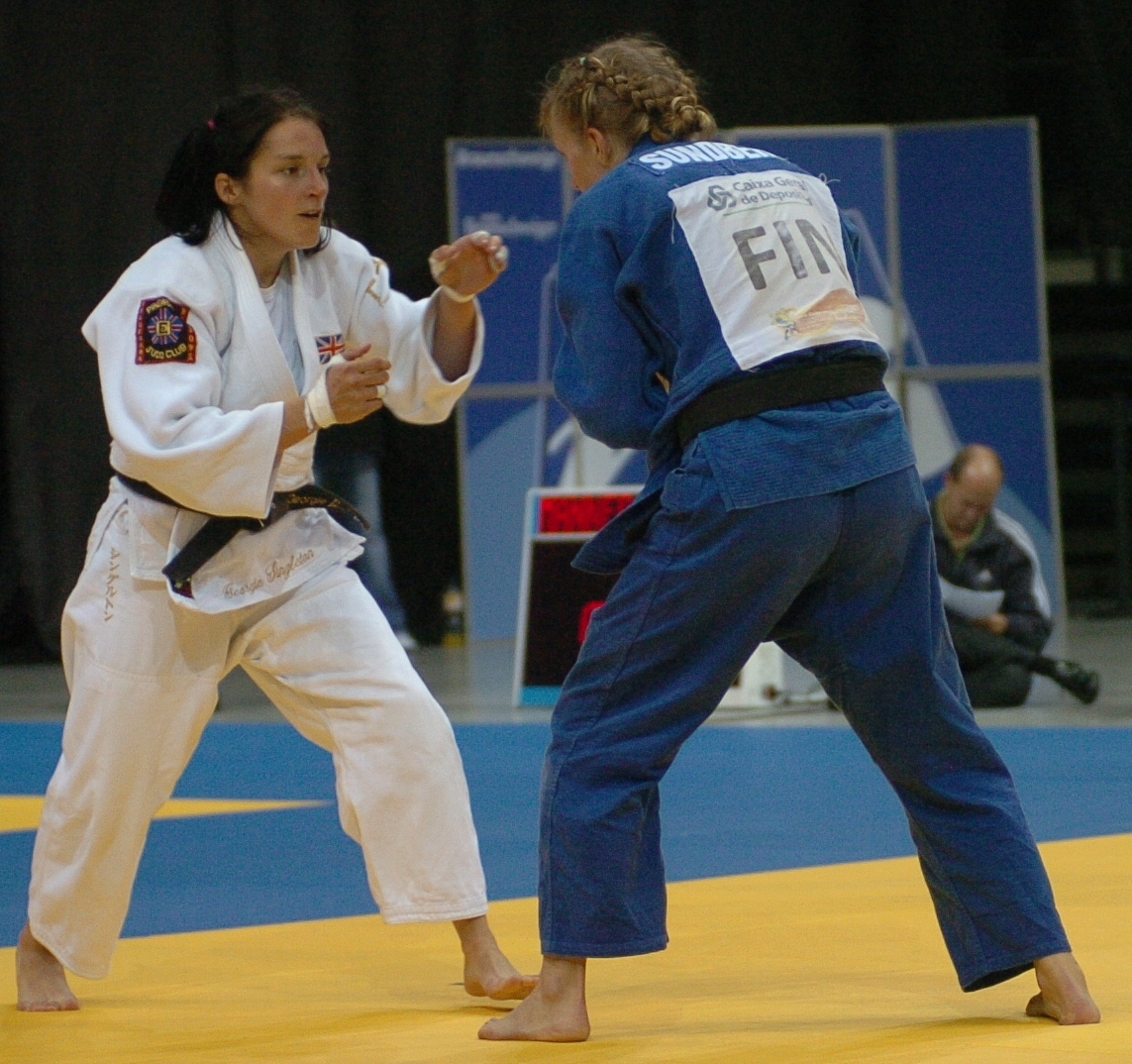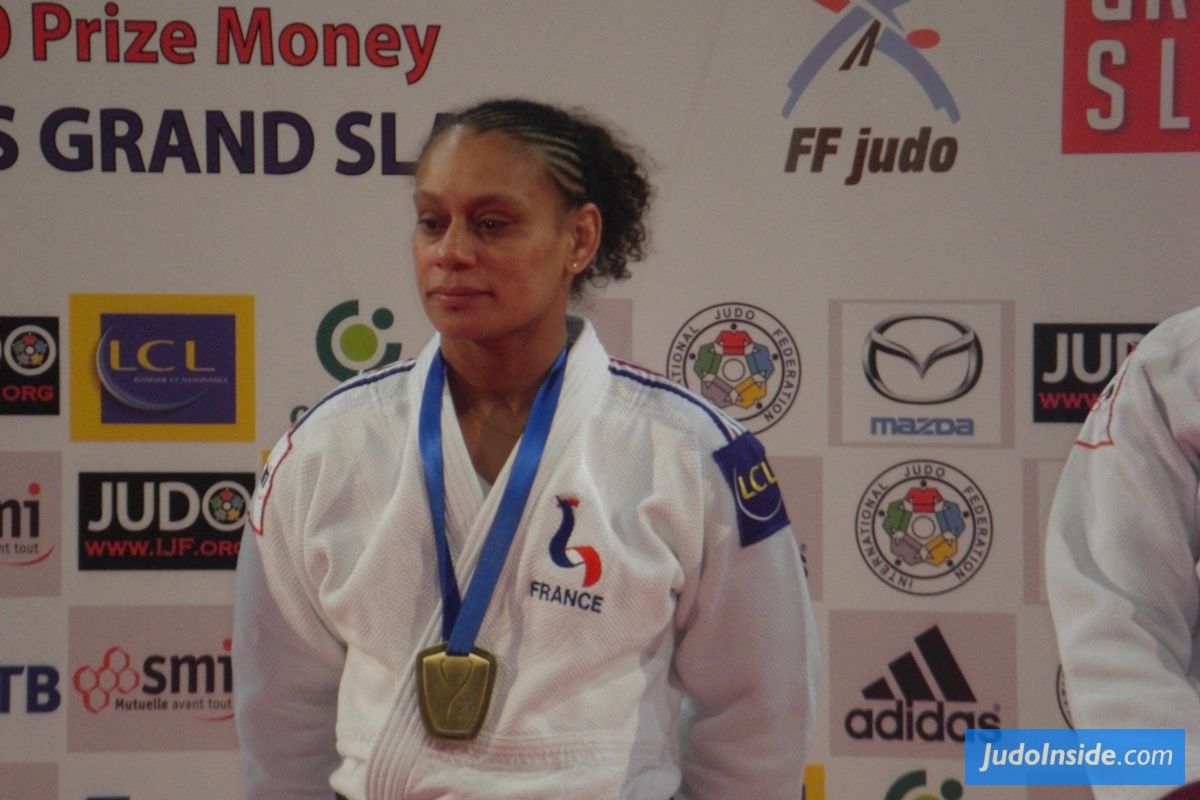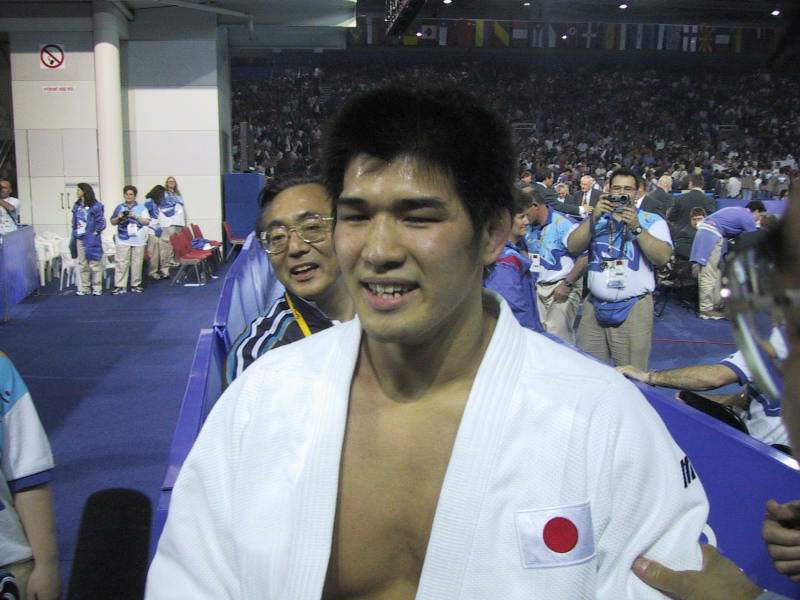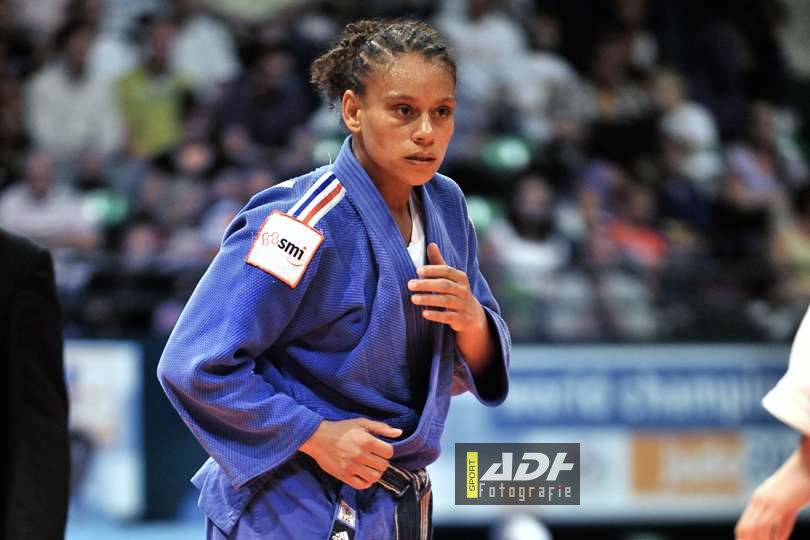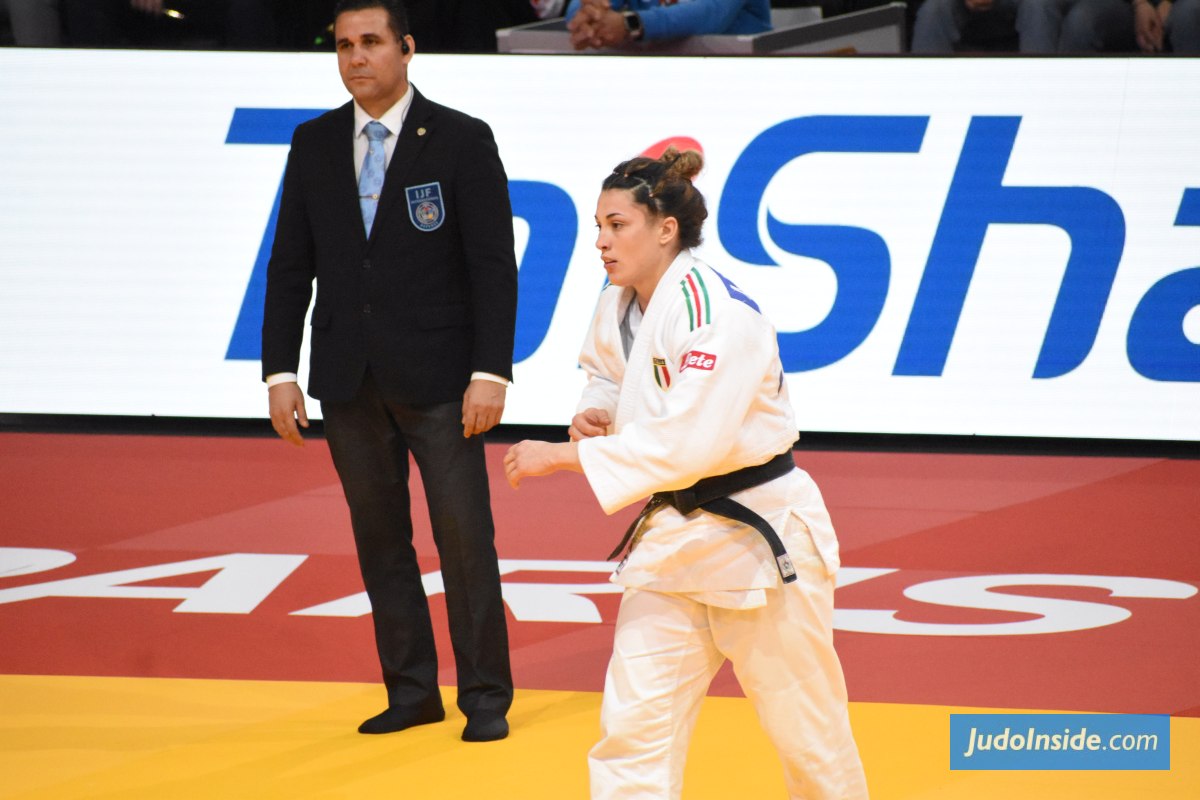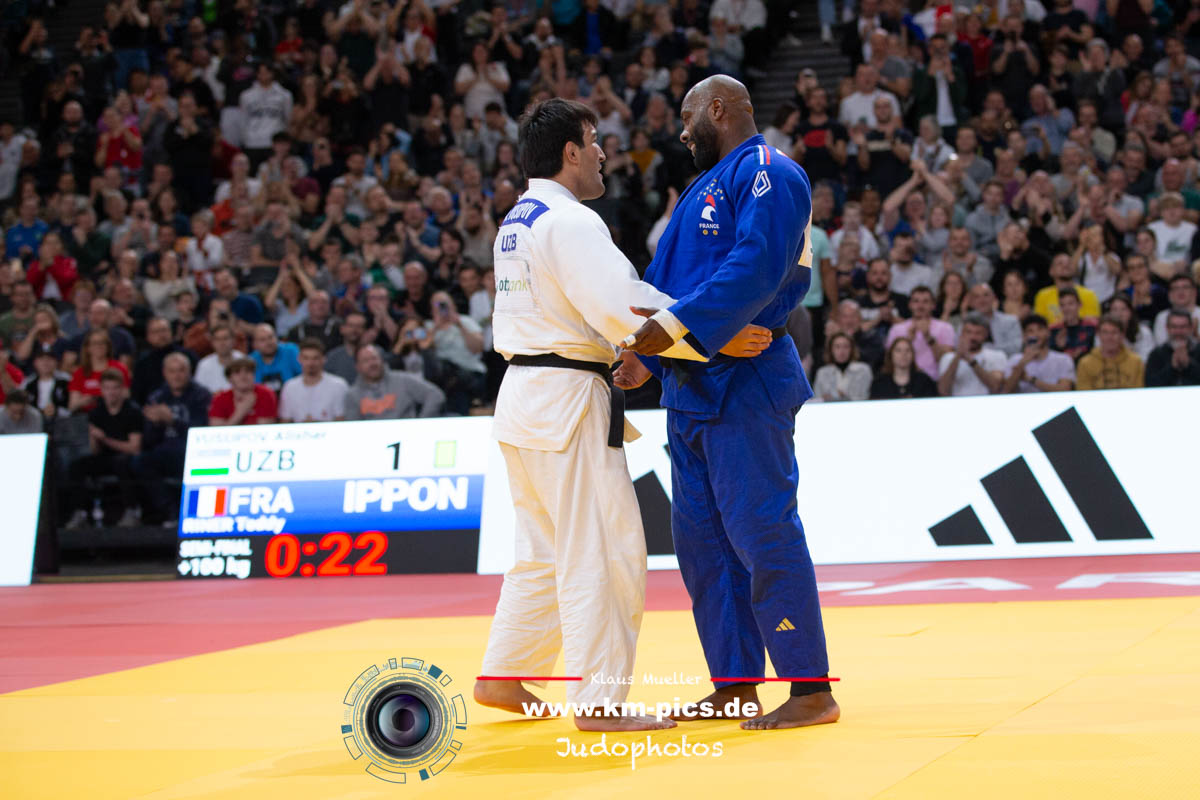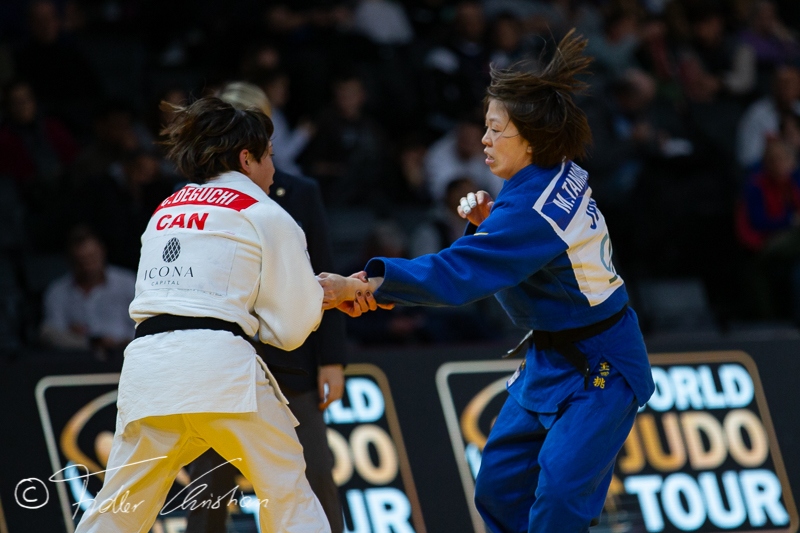Report of the European Championships 2001 in Paris Day 1
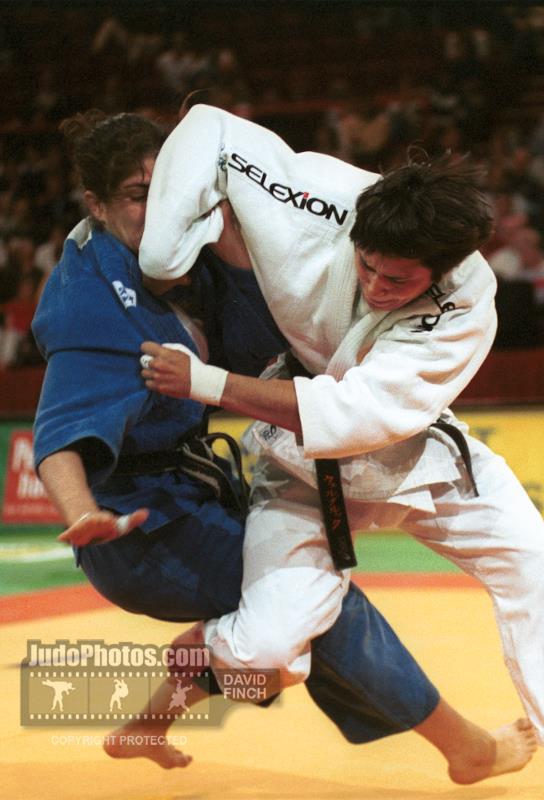
 18 May 2001 20:05
18 May 2001 20:05
 TWOJ, the world of Judo, by Barnaby Chesterman
TWOJ, the world of Judo, by Barnaby Chesterman
 David Finch / Judophotos.com
David Finch / Judophotos.com
Exactly 50 years since the first European championships, the tournament returned to it's first home in the romantic city of Paris in France. And romance was on the menu on the opening day of the tournament as Ulla Werbrouck made the headlines by winning her seventh European title.
In a stadium that was embarrassingly empty for most of the day, a handful of Belgian fans cooked up an impressive atmosphere for their limited numbers every time the great champion stepped onto the mat and she was swept up to seventh heaven on a wave of sound. Seven titles is a great achievement, but on top of that, it was Werbrouck's 13th medal at consecutive European championships, something not even the great Ingrid Bergmans achieved (although she did win more medals as she always fought in the open category as well as her weight).
But although Werbrouck's was the story of the day, there were also plenty of other headline grabbers, such as Ariel Zeevi claiming Israel's first ever European judo gold medal and Celine Lebrun lifting her third successive under 78kg crown for the home nation. With many past European champions having retired after the Olympic Games last year, there was also an opportunity for a new breed to stake their claim for titles. And all this on those popular yellow mats.
Women's over 78kg category
The reigning champion, Karina Bryant of Britain, was replaced by Simone Callender for the heavyweight category, although Bryant will fight in the Open instead. Callender took advantage of her rare opportunity in this division to squeeze past Malgor Gornicka of Poland in the first round, but then came unstuck against the powerful German, Katja Gerber, in the quarter-final.
Gerber dominated with her high left-hand lapel grip and was never in any danger as she forced two penalties to reach the last four. There she faced Mara Kovacevic of Yugoslavia, but again she never looked in any danger. Gerber scored Yuko with a left Harai-goshi and wound up the Yugoslav to Keikoku before finishing her off with an Ippon from a left Ko-soto-gari.Gerber's progress to the final was impressive, but so too was that of Tzetlana Dongouzachvili of Russia who similarly dominated her side of the draw. The Russian pined the new French heavyweight fighter, Lindsie Marguerite, for Ippon in the first round and then threw Clementina Papa of Italy for Waza-ari in the quarter-finals. Dongouzachvili then claimed her place in the final by throwing Marie-Elis Veys of Belgium, another new face on the tatami, for Ippon.
Gerber was the favourite going into the final, having won the Open title in 1999. And she was first onto the score sheet with a Tani-otoshi take down registering a Waza-ari. But Dongouzachvili staged a fightback and was a little unlucky only to be giving a Koka for a similar technique to Gerber's. The German resorted to defensive measures to hold on and was twice penalised for passivity, but that was not enough for the Russian who had to settle for the silver medal.
The home crowd's hopes for a first medal of the day were dashed when Marguerite tamely succumbed to Kovacevic in the first bronze meal fight. The French woman was trying an Uranage but got it all wrong and collapsed on her back with her opponent landing on top of her for an Ippon victory that she did little to merit. The other bronze medal went to Veys who threw Susan Somolinos of Spain, also for Ippon. Somolinos was somewhat fortunate to have made it to the bronze fight, having been handed a 'golden score' victory against Callender in the repechage final when the Brit was penalised for passivity despite having been by far the more attacking throughout the contest.
Men's over 100kg category
With David Douillet retiring after his Olympic swansong last year where he became the most successful Judoka ever in international competition, the French hopes rested on Jerome Dreyfus. The new number 1 French heavyweight is small compared to most of the fighters in his category, but caused a sensation at the Tournoi de Paris earlier this year when he threw the giant, 200kg Spanish reigning Open champion, Aythami Ruano, for Ippon in the final.
French TV had focussed on the Tournoi champion throughout the week as he is now trained by Douilet. But Dreyfus was caught with a sucker punch in his first fight, when a failed attempt at a sacrificial throw, gifted Dennis Braidotti of Italy an Ippon victory. Braidotti had never before won a medal at this level, but he was having one of those days where everything seems to be falling into place. In the quarter-final he edged out the reigning champion, Dennis van der Geest of the Netherlands, by a penalty and then he threw the dangerous Georgian, Alexsi Davitashvili for ippon in the semi-final. Braidotti scored with a peculiar O-soto-gari, gripping his opponent round the waist rather than on the lapel.
Braidotti was destined to be an overwhelming under-dog in the final after the other semi-final pitted three-time European champion, Selim Tataroglu of Turkey against two-time champion, Tamerlan Tmenov of Russia. Both had demonstrated the virtues of skill against size in the previous round, overcoming 200kg opponents. Tmenov benefited from Ruano's negativity while Tataroglu threw Valentin Ruslyakov of Ukraine for Ippon with Uchi-mata.
In their semi-final Tmenov was still giving away about 30kg but was unfazed again and took the fight to his bigger Turkish opponent. Tmenov scored Yuko with a left-handed
Uchi-mata and then followed that into a hold. The Russian was completely off the mat and was only scoring with the hold because Tataroglu's left foot was still in the mat area. But the Turk never realised this and rather than lifting his foot out of the mat area to cancel the hold, he actually rocked Tmenov back onto the mat to hold on for an Ippon victory.
The final was quite a mismatch with the brilliant Russian again proving that, in his case, size doesn't matter. Tmenov needed just 23 seconds to throw Braidotti for Ippon with a stunning left Uchi-mata. In mid-throw, the Italian looked likely to land on his front or side, but Tmenov gave just an extra little pull on the sleeve to turn Braidotti onto his back for a perfect score and regain the title he lost in last year's final to van der Geest.
Having lost to one small heavyweight in the semi-final, Tataroglu was again in danger against Dreyfus in the bronze fight, after the Frenchman had overwhelmed van der Geest in the repechage. Dreyfus frequently came close to scoring with drop Ippon-seoi-nage attacks and a couple of Tomoe-nage attempts. But Tataroglu needed only one chance and took it to throw Dreyfus for Ippon with a side take down, executed at great speed for such a big man. Davitashvili also bounced back from semi-final disappointment to take his place on the medal rostrum, by throwing Ruslan Sharpau of Byelorussia for Ippon.
Women's under 78kg
Celine Lebrun of France was both the defending champion and the overwhelming favourite to land a third straight European title having been by far the best performing European over the last two years. But on home soil the expectation was high.
In 1999, Lebrun won her first European title and then also added a bronze medal at the World championships in Birmingham. She was the only European to win a medal there and then won a silver medal at the Olympics last year after her second European title. Lebrun was, in truth, robbed in the final on a split judges' decision with the gold medal going to the Chinese fighter, Lin Tang. But, yet again, Lebrun was the top-placed European.
In this small field of just 10 fighters, Lebrun went straight into a quarter-final against Catarina Rodrigues of Portugal. Rodrigues caused Lebrun some problems, but her strong left-handed belt grip, allowed her to dominated the attacking. Rodrigues was twice penalised for passivity in desperate defence and Lebrun marched into the last four. Again she had a tough fight against Claudia Zwiers of the Netherlands, but through with a Yuko from her trademark Russian-style left Harai-goshi.
The other finalist was the Belgian, Heidi Rakels, who once again mastered the knack of squeezing threw when appearing to deserve to lose. Herr first fight she trailed former champion, Esther San-Miguel of Spain, for most of the fight, before scoring a late Yuko to win. Then a late Tani-otoshi counter technique scored Waza-ari against Poli Tchekanina of Russia when again she had trailed by a penalty for long periods. In her semi-final she was thrown for Waza-ari by Anastasia Matrosova of Ukraine, but she then used her experience to grind her way back into the fight. Matrosova seemed to freeze with victory in her grasp and conceded three penalties to tie the scores and give Rakels a chance in sudden death. The wily Belgian took full advantage and scored a Waza-ari herself that Matrsova almost turned into a score for herself.
Rakels' cagey tactical ploy held Lebrun for three minutes in the final, but the aggressive Frenchwoman has proved over the last two years that she's dominant in Europe in this category and her combative style gradually wore down the Belgian. Lebrun scored Ippon with a left-sided Koshi-guruma but then couldn't fight back the tears of joy from winning in front of her home crowd.
Zwiers came back in the bronze fight to beat Tchekanina with a busy attacking display. Zwiers scored a lighting quick Koka and then continued to pressure the Russian throughout. She clinched the medal with a left Harai-goshi for Ippon and her first European medal since winning under 66kg gold in 1996. Another fighter who's switched weight categories to good effect is Michelle Rogers of Britain who was twice a medallist in the over 72kg category before the weights were changed. Rogers faced Matrosova for the other bronze medal and won it with a driving leg-grab O-uchi-gari for Yuko mid-way through the fight. Matrosova also picked up a chui and never had an answer to Rogers' strong hip-throw attacks.
Men's under 100kg
Another Frenchman, Ghislain Lemaire, came under the spotlight to see if he could fill the shoes of a departing champion. Stephane Traineau bowed out of international judo with a bronze medal in Sydney last year, but was also world champion in 1991 and won three European titles in his career. Lemaire was no stranger to playing the role of understudy to Traineau, having twice before won medals when filling in for the man who is now his coach.
Lemaire opened with a tough battle against the 1992 Olympic and 1993 World champion, Antal Kovacs of Hungary. Apart from a stunning victory against the incomparable Kosei Inoue of Japan at the Millennium Cup in Budapest earlier this year, Kovacs results have never lived up to his early heroics. Once again he looked like a spent forced and laboured his way to a golden score defeat against Lemaire. The Frenchman then disposed of Alexei Cornescu of Moldova with a lightning quick Tomoe-nage before throwing Daniel Guerschner of Germany for Ippon with Uchi-mata. Lemaire looked like falling by the wayside in the semi-final when he trailed the Finn, Timo Peltola, by a penalty and a Koka with time running out. But the Finn cracked and gave away to passivity penalties to hand the fight to Lemaire.
In the other half of the draw, two fighters were looking highly impressive. Ariel Zeevi disposed of opponents with some classic attacking judo, including a defeat of Elco van der Geest of the Netherlands in just 32 seconds in the quarter-final. His semi-final opponent was Iveri Jikurauli of Georgia who totally outgripped Pawel Sitarsji of Poland in his quarter-final before throwing him for Ippon with Ura-nage to but some gloss on his display. Zeevi was on fire, though, and Jikurauli never got close to him in the semi-final encounter. The Israeli scored Yuko with Ko-soto-gari and then Ippon with Ura-nage.
The final was an entertaining affair with the home crowd willing on Lemaire. His Tomoe-nage had worked to good effect throughout the tournament, but he seemed reluctant to use it against Zeevi and paid the price. Zeevi scored Yuko with a drop Seoi-nage and then added a Koka. Lemaire could not get anywhere near him and Zeevi finally finished off his opponent in the last minute with a brilliant Te-guruma pick-up for Ippon. It was Israel's first European gold medal and one that's looked likely from Zeevi ever since he wowed the crowds with brilliant Ippon victories to take fifth places at the 1999 World championships and last year's Olympic Games, (he lost to Traineau for the bronze).
Jikurauli was in trouble against former champion, Guershcner in the bronze medal fight, having been thrown for Ippon. But the German tried to hang on and conceded penalties to level the score. The fight went into sudden-death and with Guerschner wilting, Jikurauli threw him with a left-sided leg-grab O-uchi-gari to win the medal. Peltola was another who seemed to wilt as he lasted far longer than he is accustomed to at this level. Peltola was soundly outclassed by van der Geest for the other podium finish, conceding two Yuko scores and two penalties. After the disappointment of Dennis' elimination in the heavyweights, it was nice to see another van der Geest on the podium.
Women's under 70kg
This was another small field, but that mattered little to Werbrouck who was chasing history. Now, another great Belgian, Ingrid Bergmans, won 14 European medals and the Dutch fighter, Angelique Seriese won eight golds, but both fought in the Open weight category as well as their own weight. Werbrouck's success has all been achieved in a single weight category and she had won a medal ever year since 1989 coming into this championship.
Unlike previous years, though, where she won majestically, Werbrouck was forced to scrap for everything this year. Her defeats against Ursula Martin of Spain twice last year in the European semi-final and the first round of the Olympics, proved some fighters could nullify the threat of her potent Uchi-mata. And again today spoiling tactics restricted her. Nicky Boontje of the Netherlands was beaten thanks to a penalty score and then Amina Abdellatif of France was edged out by a Koka. Werbrouck's semi-final was the closest of the lot as she needed sudden death to overcome Mariela Spacek of Austria. But almost two minute's into that extra period was the only time Werbrouck had a chance to work her magic and she scored Waza-ari with her favourite Uchi-mata to secure a place in the final.
With last year's champion, Martin, absent, her replacement, Cecilia Blanco, took over where she had left off, beating Andrea Pazoutova of the Czech Republic and Alina Croitoru of Romania en route to the semi-final. There she met the young British hope, Amanda Costello, who had stormed to that stage with quick Ippon victories in 15 and 29 seconds against Iouli Semenova of Russia and Svetlana Tsimashenka of Byelorussia respectively.
Costello, just 20-years-old and standing in for Olympic silver-medallist, Kate Howey, could not repeat her earlier dynamic attacking against the tactically astute Spaniard.
The fight went into sudden-death and Blanco scored with a low Ippon-seoi-nage to face Werbrouck in the final.
The Belgian was determined not to succumb to another Spaniard this year and controlled the grip right from the start. She scored Koka with Ko-soto-gari and added Yuko with a rare left Ko-ouchi-gari. Werbrouck had injured her right thumb in her semi-final and was having difficulty gripping, but she took her time during breaks and used all her experience to secure her seventh title and a 13th successive medal.
With Costello's early puff blown away, she was a shadow of her earlier self and could not match Adriana Dadci of Poland in the fight for bronze. Two all-or-nothing clinches went the way of the Pole, who scored Yuko both times, who then secured her medal with an Ippon from O-soto-gari. The other bronze fight went to sudden death as Spacek stage a late rally to level the score against Semenova in regulation time. The Russian then gave away a passivity penalty in the extra time period and had to settle for fifth place.
With five different countries winning gold medals on the first day, this European championships looks set to be an entertaining won with a wide spread of medallists. And as some top fighters seem to be resting before the World championships, there could be a few more new names standing on the top tier of the rostrum before the weekend is over.
 like
like
 share
share
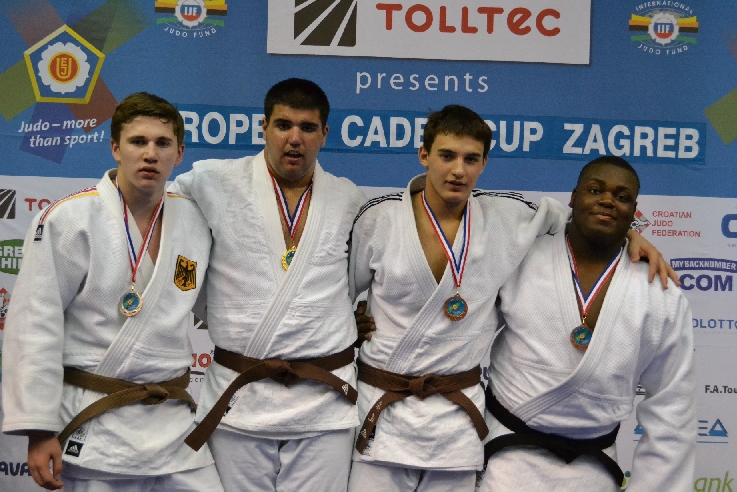
| Result | City | Date |
|---|---|---|
| 2 | Paris | 2024 |
| 1 | Abu Dhabi | 2024 |
| 1 | Zagreb | 2024 |
| 3 | Belgrade | 2023 |
| 2 | Montpellier | 2023 |




